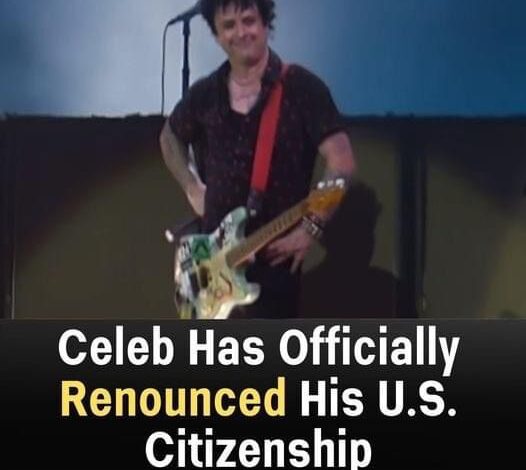Another famous celebrity makes headlines renouncing citizenship – Find out where he’s headed next now!

In a surprising move, Green Day’s frontman Billie Joe Armstrong recently made headlines by revealing his plan to renounce his U.S. citizenship. This announcement came in response to the Supreme Court’s controversial decision to overturn Roe v. Wade, a ruling that had protected the right to abortion in America for nearly five decades. Armstrong’s remarks have sparked intense reactions among fans and political commentators alike, underscoring the deepening divide in the country.

Armstrong made this declaration during Green Day’s concert at the London Stadium last Friday, where the punk rock legend didn’t hold back his disapproval of the current state of American politics. Addressing thousands of cheering fans, Armstrong, who has led the band since 1987, expressed his frustration with the recent developments back home. “I’m renouncing my citizenship,” he declared to the crowd, drawing a mixture of gasps and applause. The statement wasn’t just a fleeting comment; it came from a place of deep dissatisfaction with the direction in which the U.S. is heading.
The rock star, known for his rebellious spirit and strong opinions, went further by emphasizing that he was entirely serious about his decision. “Oh, I’m not kidding,” Armstrong added, doubling down on his intent. “You’re going to get a lot of me in the coming days.” The audience responded with loud cheers, clearly resonating with his message. For Armstrong, it seems the recent Supreme Court ruling was the last straw, pushing him to consider spending more time in Europe, where he feels a stronger alignment with social values.
The following night, during another Green Day show in Huddersfield, England, Armstrong continued to express his discontent with the U.S. His words struck a chord with fans who have been equally frustrated by the recent shifts in American policies. The rocker’s statements have reignited debates over how public figures use their platforms to influence social and political conversations. For Armstrong, this isn’t the first time he’s been vocal about his political beliefs, but his latest announcement has taken things to a whole new level.
Armstrong’s outspoken criticism of the Supreme Court’s decision is just one example of how celebrities are using their influence to speak out on political issues. Over the same weekend, pop sensation Olivia Rodrigo joined the chorus of disapproval during her performance at the U.K.’s Glastonbury music festival. Rodrigo, who shot to fame with her hit song “Driver’s License,” took a moment during her set to directly address the Supreme Court justices who had voted to overturn Roe v. Wade.
In a powerful and defiant gesture, Rodrigo called out the justices by name, dedicating a song to them. “This song goes out to the justices: Samuel Alito, Clarence Thomas, Neil Gorsuch, Amy Coney Barrett, Brett Kavanaugh,” she announced. “We hate you!” The crowd erupted in applause, showing support for Rodrigo’s bold statement. Her willingness to call out specific individuals responsible for the ruling highlights a growing frustration among younger generations who are demanding accountability from those in power.
Rodrigo’s passionate speech at Glastonbury adds to the wave of protests and public outcry that have emerged in response to the Supreme Court’s ruling. For many, the decision to overturn Roe v. Wade represents a significant setback in the fight for women’s rights and individual freedoms. By taking a stand on such a high-profile stage, both Armstrong and Rodrigo are demonstrating how artists can leverage their platforms to inspire social change.
While Armstrong’s declaration to renounce his citizenship might seem drastic, it underscores a broader sentiment of disillusionment among many Americans. The punk rocker’s plan to spend more time overseas could be a symbolic act, distancing himself from a country that he feels is regressing on fundamental rights. Whether he will actually go through with the legal process of renouncing his citizenship remains uncertain, but his words have certainly sparked conversations about patriotism, freedom, and the responsibilities of public figures.
Rodrigo, on the other hand, has made it clear that she’s not afraid to use her voice to call out what she sees as injustices. Her decision to directly name the justices responsible for the controversial ruling demonstrates a new level of activism among young celebrities. It’s no longer just about entertaining their fans; it’s about taking a stand on critical issues that affect their audiences.
As the political climate in the U.S. continues to evolve, it’s clear that public figures like Armstrong and Rodrigo will not stay silent. Their outspoken reactions to the Supreme Court’s decision have sparked conversations both in the U.S. and abroad, showing that the impact of this ruling goes beyond national borders. For many fans, these artists are not just musicians but also voices of resistance, pushing back against what they perceive as injustices in society.
In the coming months, it will be interesting to see if Armstrong follows through with his declaration to renounce his citizenship. Whether it’s a symbolic gesture or a genuine plan, his words have left an indelible mark on fans who share his disillusionment. Meanwhile, artists like Rodrigo will likely continue to use their platforms to amplify the voices of those who feel marginalized by recent political developments.
Ultimately, the actions of Armstrong and Rodrigo remind us that in today’s world, the line between entertainment and activism is becoming increasingly blurred. These celebrities are proving that they’re not just here to perform but also to challenge the status quo, encouraging their fans to think critically about the state of the world. As more public figures join the conversation, the impact of their words may well inspire a new wave of social and political change.




